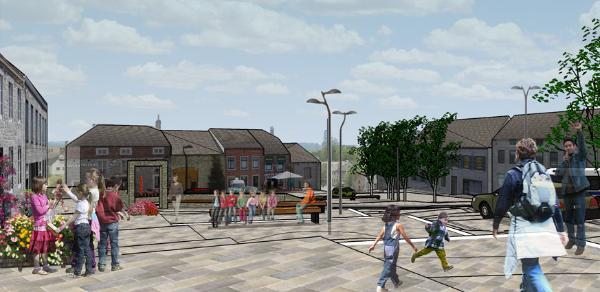
This smart and sustainable project – conceived and supported by local residents – will be financed by Belfius and the European Investment Bank (EIB). This investment will make it safer to drive through Heer-sur-Meuse, while a pleasant, tree-lined village square will also be created, completely transforming the village.
Turning an unsafe crossroads into a pleasant square decorated with plants and complete with economical and sustainable lighting and street furniture will represent a major change for the small village of Heer-sur-Meuse on the French-Belgian border. The project was conceived and supported by local residents as part of the Municipal Rural Development Plan, and the Municipality of Hastière will once again receive favourable financing via the Smart Cities & Sustainable Development programme managed by Belfius using its own and EIB funds.
For several years, the Municipality of Hastière in the south of Namur province has been endeavouring to improve the energy performance of its buildings and rethink its public spaces in order to foster a pleasant atmosphere, the use of environmentally-friendly means of transport and accessibility for people with reduced mobility.
Following the complete refurbishment of its Tourist Office with an emphasis on energy efficiency, the municipality of Hastière is now once again demonstrating that the “Smart Cities” programme is not reserved for cities, with small rural municipalities also able to take full advantage of the initiative.
Conceived by the local residents themselves as part of the Municipal Rural Development Plan, the remodelling of the centre of the village of Heer-sur-Meuse is the second project launched by the municipality of Hastière to benefit from the favourable Smart Cities & Sustainable Development financing programme set up by Belfius and the EIB.
The project involves altering the route of the main road at a reputedly dangerous crossroads in the centre of the village in order to improve visibility and safety for users. It includes narrowing the rue Prince Albert to reduce the speed of vehicles and aims to make the current crossroads into a real municipal square, integrating the various roads and surrounded by pavements, plants and parking spaces, particularly for people with reduced mobility. Various different materials will be used to create separate zones, while street furniture and an economical and high-performance lighting system will be installed. Overhead electrical wiring will be removed and cables buried underground. The water supply network will also be renewed and altered in line with the new layout. Work will begin in spring 2017 and will continue for 180 days until completion in early 2018.
Favourable financing
Following an in-depth appraisal of the dossier, the experts at the EIB and Belfius concluded that this project displayed a strategic, innovative and sustainable approach, and that it could be considered for financing on favourable terms under the Smart Cities & Sustainable Development joint programme.
In two and a half years, no less than 62 “Smart” projects totalling around EUR 400m have been financed via this programme, including the remodelling of the Croisette in Dinant, the refurbishment of the Hastière Tourist Office and the new town hall in Gembloux. These 62 projects, that are already complete or are currently in progress, affect more than 1 400 000 people.
Following the success of the Smart Cities & Sustainable Development programme – a European first when it was launched in June 2014 – Belfius and the EIB announced on 8 December their intention to jointly provide an additional EUR 400m to finance even more smart, inclusive and sustainable projects mounted by local authorities, inter-municipal utilities and social sector (education and healthcare) non-profit organisations.
The scope of this brand new programme, dubbed Smart Cities, Climate Action & Circular Economy, has therefore been widened to encompass the social sector, and aims to make investments “circular” in nature. It covers not only energy performance, mobility and urban development, but also water (distribution networks, sewers, drainage, treatment), waste (selective collection, sorting, biological treatment and sludge treatment, energy production) and e-government (particularly open data). In addition to an integrated, innovative and sustainable approach, the circular economy and climate action are now specific focal points of project appraisal and evaluation.
With this new programme, the partners Belfius and the EIB intend to continue actively supporting the Smart Cities initiative in Belgium, thereby contributing to sustainable growth – a source of prosperity and social progress for people and businesses.

©Hastière - « DESSIN ET CONSTRUCTION »
Download original